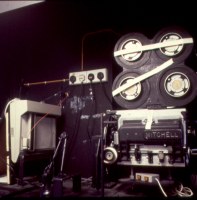brief CV
In 2004 I retired from full time work as an engineer in the film and TV industry. Since then I have had the time to develop my life long interest in making guitars and similar musical instruments. I currently make around six instruments a year in my workshop in Ditchling as well as carrying out repairs and customizations.
Before I finally left the film and TV industry I provided the technical content for the IMIS (formerly BKSTS) Digital Intermediate wall chart. In October 2006 the BKSTS gave me The Roland Chase Award.
1998 – 2004 Double Negative
Total responsibility for colour and film quality control.
Also involved in all aspects of engineering a new computer visual FX company.
At Double Negative we worked on many high profile movie projects, beginning with Pitch Black (2000) and including Billy Elliot (2000), Enemy at the Gates (2001), Bridget Jones’ Diary (2001, 2004) and Finding Neverland (2004) as well as many others.
1990 – 1998 Moving Picture Company
Designed, built and wrote the software for Moving Picture Company’s Filmtel video to film transfer system.
Total engineering responsibility for the original Digital Film installation.
From a standing start the Digital Film department built a serious track record of mainstream feature film work, including Richard III (1995), Goldeneye (1995), The English Patient (1996) and The Borrowers (1997).
1983 – 1992 Computer FX
Co founder of a pioneering computer graphics company in the days when computer animation was really difficult.
1982 – 1983 Moving Picture Company

Motion control and plotter based computer animation
1967 – 1982 BBC
Engineering Research (then at Kingswood Warren) and Television Studio Engineering.
Early development work on digital frame store based FX.
UK Patent 1556811 granted for work on blue screen shadow reproduction.
Television special effects was a very different business in the days before readily available computer power.
1963 – 1967
Manchester University, in the days when it housed Atlas, the most powerful computer in the world, studying physics and electronics.
